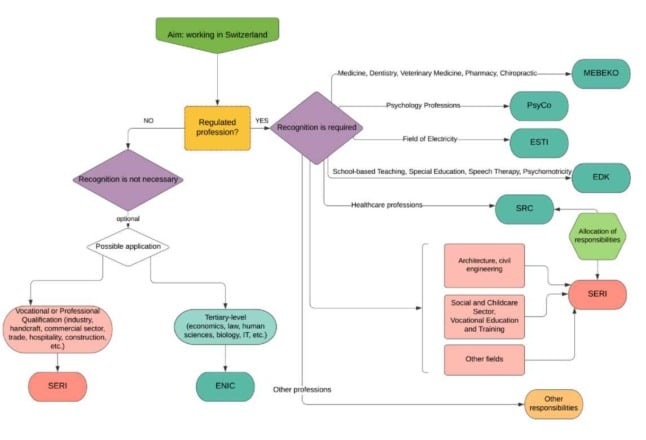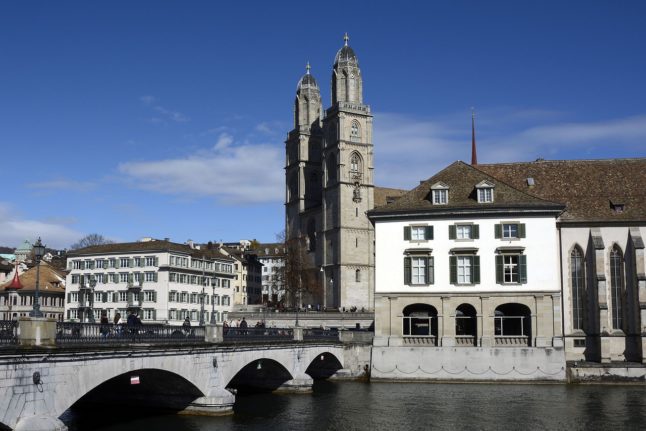Switzerland is a hub of international workers in a diverse variety of industries.
From high-skilled to low-skilled workers, Switzerland is a popular destination country for work.
An estimated 25 percent of people who live in Switzerland are foreign, while a further 500,000 cross the border from France, Germany, Italy or Austria into Switzerland for work regularly.
If you didn’t study at a Swiss university or complete an apprenticeship in Switzerland, you can have your foreign qualifications recognised in order to work in Switzerland.
READ ALSO: How wealthy foreigners can ‘buy’ a Swiss residence permit
You’ll need a copy of your qualifications (possibly translated), while in some cases you’ll have to pay a fee.
Whether you are coming from the EU or not will also be an important factor, as Switzerland has adopted the EU’s system of mutual recognition of professional qualifications.
Here’s what you need to know.
How to have your foreign qualifications recognised in Switzerland
Switzerland needs workers in several different industry types, which means that the rules are relatively relaxed when it comes to recognition of foreign qualifications.
Workers who have their foreign qualifications recognised will be a confirmation that the qualifications are the same as their Swiss equivalent.
In some cases foreign qualifications will only be partially recognised, meaning that additional study or training may be necessary.
In other cases, training in a Swiss language (usually to B1 level) will also be required, but in many cases working in English or another language without learning either German, Italian or French will be acceptable.
What kind of profession do you work in?
The first step is to determine whether you are in a ‘regulated profession’ or an ‘unregulated profession’.
Everyone in a regulated profession will need to have their qualifications validated. Those in unregulated professions will not need to take this step.
There is no hard and fast list of what amounts to a regulated profession and what doesn’t.
Whether a profession is regulated or not can differ from canton to canton.
How to apply for Swiss citizenship: An essential guide
Regulated professions include most jobs where people need to complete study or training in order to start work, including for instance healthcare professionals, teachers, butchers, lawyers, pilots and bus drivers.
Unregulated professions include politicians, journalists, used car salesmen, self help gurus and plenty of other legitimate professions, although in some cases people wanting to do these jobs will need to provide documentation of the level of qualification they have received.
Furthermore, while these professions may be unregulated, having some form of qualification is likely to assist you in the process of finding employment.
An extensive list of the professions that are regulated can be found in English at the following link.
How to have my qualifications recognised in a regulated profession
If your profession is deemed ‘regulated’, then you will need to contact the specific authority which regulates your profession.
There are different peak bodies for different professions. If you work in the medical, pharmacy or veterinary sector, you will need to contact MEBEKO.
If you are a nurse, you will need to contact the SRC.
If you work in psychology, you will need to apply at the unfortunately named PsyCo.
There are also specific fields for electricians (ESTI) and teachers and educators (EDK).
If you work in architecture, engineering, childcare, vocational education or any other fields, you will need to contact SERI, the Swiss authority on these matters.
More official information from the Swiss government is available in English at the following link.

How much does it cost?
The cost of the recognition varies depending on the agency doing the recognising, but this is estimated as between CHF150 and CHF1,000.
Does it matter which country I come from?
Yes. If you come from the EU/EFTA countries, then this will likely be covered by the Swiss-EU Bilateral Agreement on the Free Movement of Persons (AFMP).
Pursuant to this arrangement, Switzerland has adopted the EU’s system of mutual recognition of professional qualifications.
More information on this is available by contacting SERI, the Swiss authority on these matters.
What about Brexit?
Up until the UK left the European Union, its citizens benefited from the EU’s system of mutual recognition of professional qualifications, which as we mentioned is applied in Switzerland as well.
But on Wednesday June 14th, Switzerland and the UK signed an agreement on the mutual recognition of professional qualifications.
This pact officially validates UK-obtained credentials in Switzerland, and vice-versa.
Although it’s not yet in force, it will mean in future that Brits coming to Switzerland for work will not need to get their qualifications recognised.
READ ALSO: What to know about Switzerland and the UK’s agreement on recognising qualifications



 Please whitelist us to continue reading.
Please whitelist us to continue reading.
Member comments